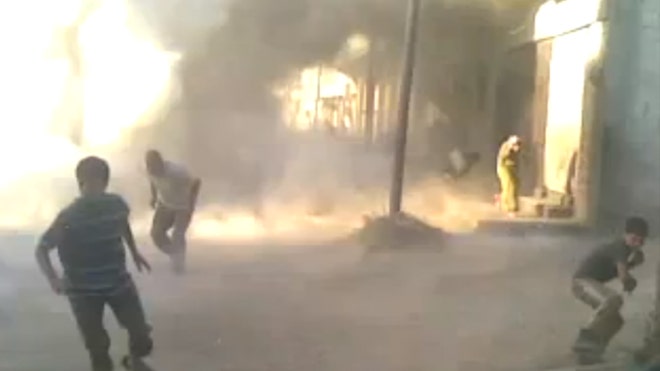
Photo: AP
The U.S. State Department is kicking out Syria's top diplomat to Washington, joining several other countries in expelling Syrian officials in a bid to increase pressure on leader Bashar Assad after recent civilian killings. Fox News confirms that the State Department has told Syria's charge d'affaires to leave.
Officials from a series of countries, including France, Britain and Australia, also said Tuesday that they were expelling Syrian diplomats.
The killings Friday in Houla, a collection of farming villages in Syria's Homs province, were one of the deadliest single events in the 15-month-old uprising against Assad's rule.
The U.N. said 49 children and 34 women were among the 108 people killed.
French President Francois Hollande told reporters Tuesday that Ambassador Lamia Shakkour will be notified "today or tomorrow" that she must leave.
Hollande said that after high-level discussions with British Prime Minister David Cameron and U.N. Secretary General Ban Ki-moon, it had been decided to deploy "a certain number of ... pressure tactics," against Syria, including the expulsion of the ambassador.
Phones at Syria's Embassy in Paris were not being answered Tuesday.
British officials said Tuesday that the U.K. is expelling three Syrian diplomats in protest at the killings, among them Charge d'Affaires Ghassan Dalla -- the country's top ranking diplomat in London. The officials demanded anonymity because they said they were not allowed to discuss the action ahead of a planned public statement from Foreign Secretary William Hague.
Hague confirmed that the United States, Canada, Germany, Spain, France, Italy and Australia were all taking action to expel the diplomats.
The ambassador to Germany, Radwan Loutfi, was given 72 hours to leave Germany on Tuesday.
Foreign Minister Guido Westerwelle said Germany and its allies hope "that this unambiguous message does not fall on deaf ears in Damascus."
The Italian Foreign Ministry said Ambassador Khaddour Hassan was called to the ministry and informed of his new status -- which was also extended to an unspecified number of Syrian functionaries.
Spain said it was giving Syrian Ambassador Hussam Edin Aala and four other diplomats based in Madrid three days to leave the country.
In Canberra, Australian Foreign Minister Bob Carr said Charge d'Affaires Jawdat Ali, the most senior Syrian diplomat in Australia, is to be expelled along with another diplomat from the Syrian Embassy. He said they were told to leave the country within 72 hours, in response to the massacre in Houla. "This is the most effective way we've got of sending a message of revulsion of what has happened in Syria," Carr said. In a statement, he called the killings a "hideous and brutal crime" and said Australia would not engage with the Syrian government unless it abides by a U.N. cease-fire plan. In Vienna, Foreign Ministry spokesman Nikolaus Lutterotti said the Syrian ambassador is being summoned to the ministry where officials will deliver a very hard protest about the massacre.
When asked if the expulsions were EU-wide, Lutterotti said this had not yet been decided. He said the ambassador to Austria would not be expelled as he holds an additional function as the representative to the UN organizations in Vienna.
The U.N. estimates 9,000 people have been killed since the uprising began in March 2011.
The U.N. said Tuesday that entire families were shot in their homes during a massacre in Syria last week that killed more than 100 people, including children. Most of the victims were shot at close range, the U.N. said.
Rupert Colville, a spokesman for the U.N. High Commissioner for Human Rights, said the conclusions were based on accounts gathered by U.N. monitors and corroborated by other sources. He said U.N. monitors found that fewer than 20 of the 108 people killed in the west-central area of Houla were killed by artillery fire. "Most of the rest of the victims were summarily executed in two separate incidents," Colville told reporters in Geneva. "At this point it looks like entire families were shot in their houses." He said witnesses blamed pro-government thugs known as shabiha for the attacks, noting that they sometimes operate "in concert" with government forces. The killings in a collection of villages called Houla near the central Syrian city of Homs last week have drawn fresh attention to the Syrian conflict, in part because of the brutality of the massacre.
Activists posted amateur videos online showing shells exploding in the village, dismembered bodies lying in the streets, then rows of dozens of dead laid out before being buried in a mass grave.
The U.N. has said government forces fired tank shells and artillery at Houla, but stopped short of blaming them for Friday's killings. Activists said most of the victims were killed by pro-government thugs who stormed the area after clashes with local rebels, but the regime categorically denied any involvement. Hollande said Tuesday that Paris will host a meeting in early July of the so-called Friends of Syria seeking a diplomatic solution to the conflict.
The Syrian ambassador to Britain left the country in March. The United States and Britain have closed their embassies in Syria.
No comments:
Post a Comment